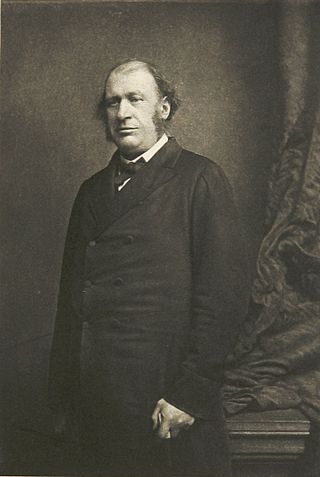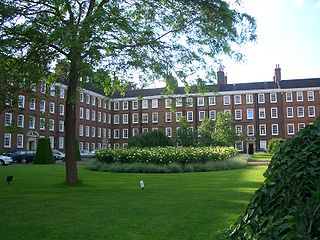
The monarchy of the United Kingdom, commonly referred to as the British monarchy, is the form of government used by the United Kingdom by which a hereditary monarch reigns as the head of state, with their powers regulated by the British Constitution. The term may also refer to the role of the royal family within the UK's broader political structure. The monarch since 8 September 2022 is King Charles III, who ascended the throne on the death of Queen Elizabeth II, his mother.

Sir James Fitzjames Stephen, 1st Baronet, KCSI was an English lawyer, judge, writer, and philosopher. One of the most famous critics of John Stuart Mill, Stephen achieved prominence as a philosopher, law reformer, and writer.

The Honourable Society of Gray's Inn, commonly known as Gray's Inn, is one of the four Inns of Court in London. To be called to the bar in order to practise as a barrister in England and Wales, an individual must belong to one of these inns. Located at the intersection of High Holborn and Gray's Inn Road in Central London, the Inn is a professional body and provides office and some residential accommodation for barristers. It is ruled by a governing council called "Pension", made up of the Masters of the Bench and led by the Treasurer, who is elected to serve a one-year term. The Inn is known for its gardens, which have existed since at least 1597.

James Robert Hope-Scott was a British barrister and Tractarian.

Sir William Blackstone was an English jurist, justice and Tory politician most noted for his Commentaries on the Laws of England, which became the best-known description of the doctrines of the English common law. Born into a middle-class family in London, Blackstone was educated at Charterhouse School before matriculating at Pembroke College, Oxford, in 1738. After switching to and completing a Bachelor of Civil Law degree, he was made a fellow of All Souls College, Oxford, on 2 November 1743, admitted to Middle Temple, and called to the Bar there in 1746. Following a slow start to his career as a barrister, Blackstone became heavily involved in university administration, becoming accountant, treasurer and bursar on 28 November 1746 and Senior Bursar in 1750. Blackstone is considered responsible for completing the Codrington Library and Warton Building, and simplifying the complex accounting system used by the college. On 3 July 1753 he formally gave up his practice as a barrister and instead embarked on a series of lectures on English law, the first of their kind. These were massively successful, earning him a total of £453, and led to the publication of An Analysis of the Laws of England in 1756, which repeatedly sold out and was used to preface his later works.

The Inns of Court in London are the professional associations for barristers in England and Wales. There are four Inns of Court: Gray's Inn, Lincoln's Inn, Inner Temple and Middle Temple.

Charles Abbott, 1st Baron Tenterden, was a British barrister and judge who served as Lord Chief Justice of the King's Bench between 1818 and 1832. Born in obscure circumstances to a barber and his wife in Canterbury, Abbott was educated initially at a dame school before moving to The King's School, Canterbury in 1769. He was noted as an excellent student, receiving an exhibition scholarship from the school in March 1781, when he matriculated at Corpus Christi College, Oxford. Here he was elected a fellow, and also served as a tutor to the son of Sir Francis Buller, which first made him consider becoming a barrister. He joined the Middle Temple in 1787, transferring to the Inner Temple in 1793, and was called to the Bar by the Inner Temple in 1796. Abbott was noted as an excellent barrister, earning more than any other during his time at the Bar, despite being considered unimaginative and a poor speaker. He was offered a position as a Justice of the Court of Common Pleas in 1808, which he turned down; he accepted the same offer in 1816, receiving the customary knighthood and being appointed a Serjeant-at-Law.

Sir Harbottle Grimston, 2nd Baronet was an English lawyer and politician who sat in the House of Commons at various times between 1640 and 1685 and was Speaker in 1660. During the English Civil War he remained a Parliamentarian but was sympathetic to the Royalists.

Frederic(k) Michael Coleridge Mackarness born at Tardebigge, Saint Bartholomew, Worcestershire, England was a British barrister, judge and Liberal politician and Member of Parliament for the Newbury constituency.
Alexander Martin Sullivan, SL was an Irish lawyer, best known as the leading counsel for the defence in the 1916 treason trial of Roger Casement. He was the last barrister in either Ireland or England to hold the rank of serjeant-at-law, hence his nickname The Last Serjeant.

The Club or Literary Club is a London dining club founded in February 1764 by the artist Joshua Reynolds and essayist Samuel Johnson.

Sir Robert Dallas, PC, SL KC was an English judge, of a Scottish family.

Sir William Garrow was an English barrister, politician and judge known for his indirect reform of the advocacy system, which helped usher in the adversarial court system used in most common law nations today. He introduced the phrase "presumed innocent until proven guilty", insisting that defendants' accusers and their evidence be thoroughly tested in court. Born to a priest and his wife in Monken Hadley, then in Middlesex, Garrow was educated at his father's school in the village before being apprenticed to Thomas Southouse, an attorney in Cheapside, which preceded a pupillage with Mr. Crompton, a special pleader. A dedicated student of the law, Garrow frequently observed cases at the Old Bailey; as a result Crompton recommended that he become a solicitor or barrister. Garrow joined Lincoln's Inn in November 1778, and was called to the Bar on 27 November 1783. He quickly established himself as a criminal defence counsel, and in February 1793 was made a King's Counsel by HM Government to prosecute cases involving treason and felonies.

The Bar of Ireland is the professional association of barristers for Ireland, with over 2,000 members. It is based in the Law Library, with premises in Dublin and Cork. It is governed by the General Council of the Bar of Ireland, commonly called the Bar Council of Ireland, which was established in 1897. The Council is composed of twenty-five members: twenty who are elected, four co-opted, and the Attorney-General, who holds office ex officio. Every year, ten members are elected for two-year terms; five by senior counsel and five by junior counsel.

Sir George Phillips Coldstream was a British barrister and civil servant who served as Permanent Secretary to the Lord Chancellor's Department and Clerk of the Crown in Chancery from 4 June 1954 to 5 April 1968. Born to an upper-middle-class family, Coldstream was educated at Rugby School and Oriel College, Oxford, where he read law. In 1930 he was called to the Bar by Lincoln's Inn, but worked as a barrister for only four years before he was recruited into the Office of the Parliamentary Counsel, where he served as Assistant to the Parliamentary Counsel to the Treasury.

Sir William Phipson Beale, 1st Baronet, KC was a British barrister and Liberal Party politician.
Stephen James Phillips is a British Conservative Party politician, barrister and recorder. He represented the constituency of Sleaford and North Hykeham as its Member of Parliament (MP) from 2010 until his resignation on 4 November 2016, when he announced that he was standing down with immediate effect owing to his irreconcilable policy differences with the government.
Charles Austin, QC (1799–1874) was an English barrister. A leader of the parliamentary bar, he was prominent in the Railway Mania of the later 1840s. According to Patrick Polden, his "career ridiculed the noble ideals of the bar".

Charles Henry Bellenden Ker (c.1785–1871) was an English barrister and legal reformer.
The Royal Commission on the Inns of Court carried out an investigation into the Inns of Court and associated Inns of Chancery between 1854 and 1855. The inns were medieval guild-like institutions that provided accommodation for lawyers and had developed gradually into centres for legal education. All barristers in the country had to be a member of one of the inns. It included many of the leading lawyers and jurists of the time. The commission found many of the inns, particularly the Inns of Chancery, were ineffective at educating students and recommended the creation of a single university of law. Steps were taken to accomplish this and a parliamentary bill was prepared but it was never achieved. The commission did, however, have an influence on legal education for decades and was a factor in the establishment of modern law schools at the universities of Cambridge, Oxford and London.
















